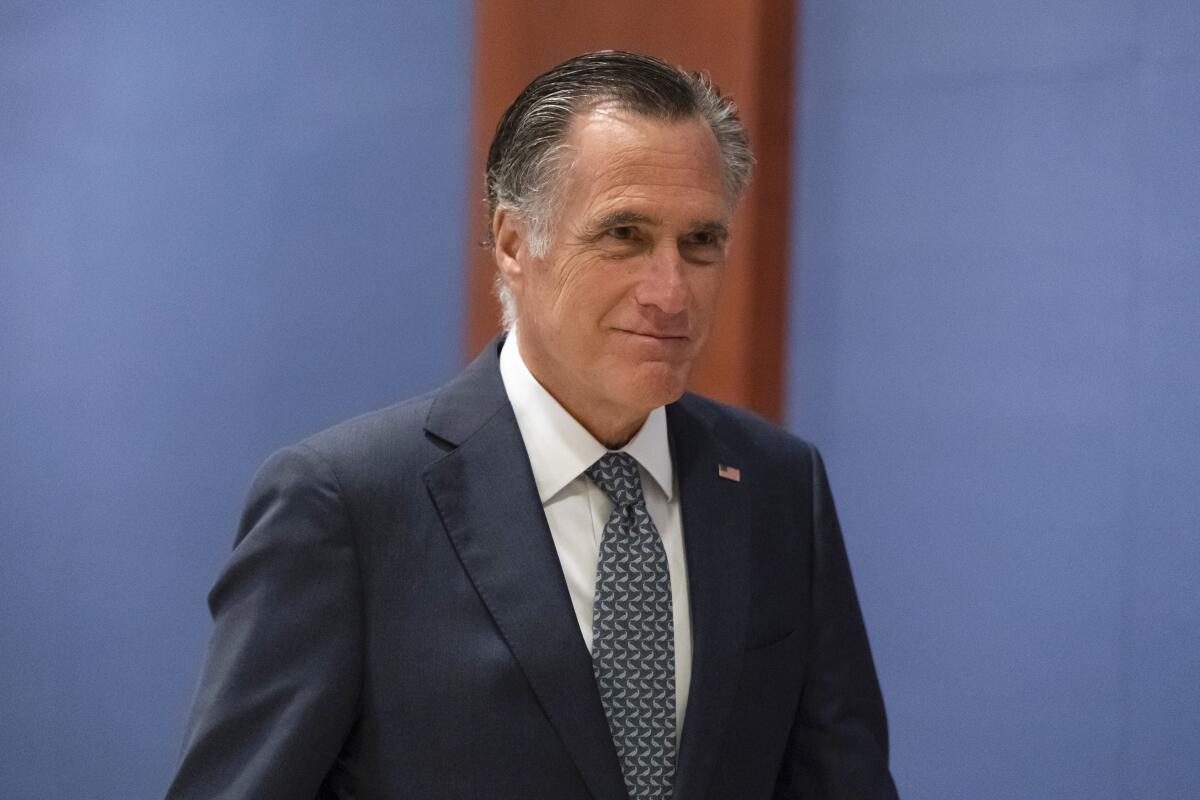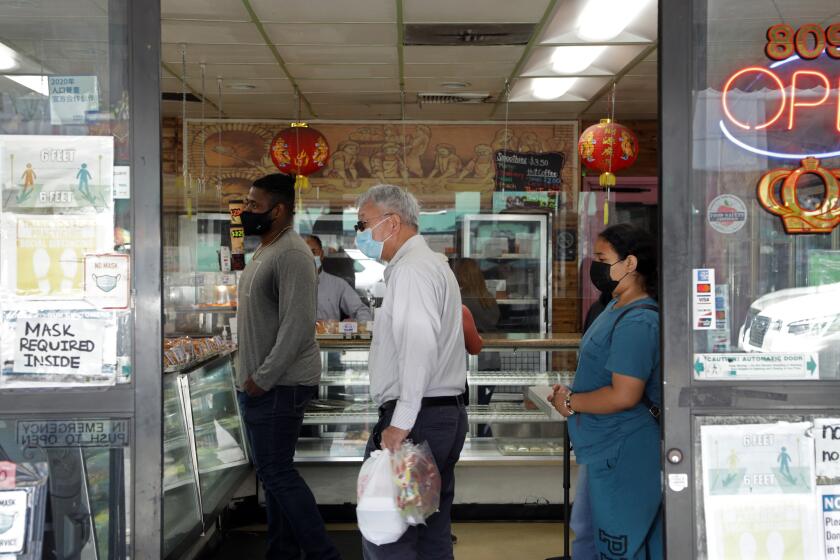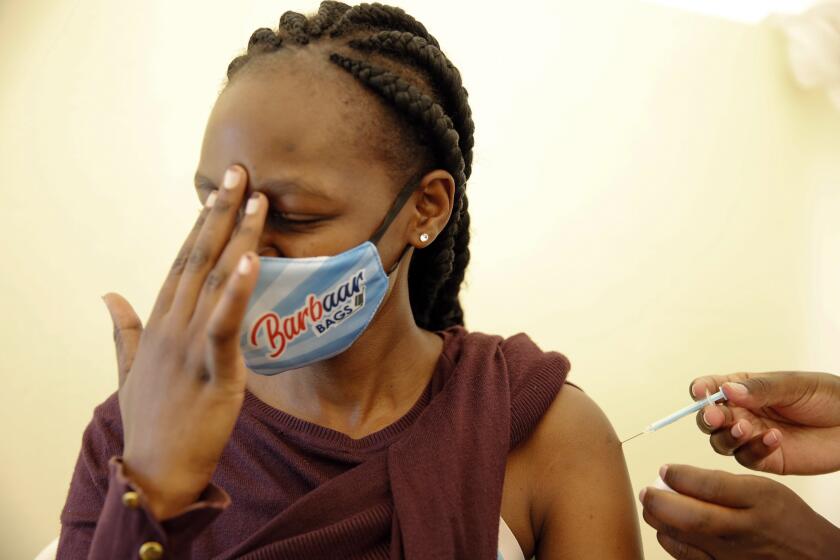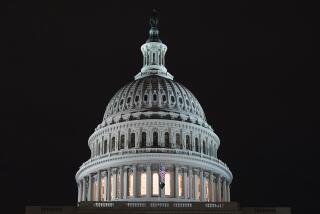Bipartisan Senate bargainers reach $10-billion COVID agreement

WASHINGTON — Senate bargainers reached agreement Monday on a slimmed-down $10-billion package for countering COVID-19 with treatments, vaccines and other steps, the top Democratic and Republican negotiators said, but the measure dropped all funding to help nations abroad combat the pandemic.
The compromise drew quick support from President Biden, who initially pushed for a $22.5-billion package. In a setback, he ended up settling for much less amid administration warnings that the government was running out of money to keep pace with the disease’s continued — though diminished — spread in the U.S.
“Every dollar we requested is essential, and we will continue to work with Congress to get all of the funding we need,” said White House Press Secretary Jen Psaki. “But time is of the essence. We urge Congress to move promptly on this $10-billion package because it can begin to fund the most immediate needs.”
Biden and Senate Majority Leader Chuck Schumer (D-N.Y.), his party’s lead bargainer, also ended up agreeing to abandon Biden’s request to include $5 billion to help countries — especially poorer ones — where the disease is still running rampant. But the two sides could not agree on enough budget savings to pay for the larger amounts.
After declines in coronavirus cases, Los Angeles County has hit another plateau this week amid the spread of highly infectious BA.2 Omicron subvariant.
Schumer said the pact would provide “the tools we need” to help the country recover from the economic and public health blows that COVID-19 has inflicted for the past two years.
But he said while the $10 billion “is absolutely necessary, it is well short of what is truly needed to keep up safe” over time.
He said members of both parties want to craft a second spending measure this spring that could include funds to battle COVID-19 and hunger overseas and more assistance for Ukraine as it continues battling the Russian invasion. The fate of such a measure is uncertain.
Sen. Mitt Romney of Utah, the lead GOP bargainer, hailed the accord as one that would address “urgent COVID needs.” He also trumped the measure’s savings, which he said meant it “will not cost the American people a single additional dollar.”
Romney also suggested an openness to considering future money. “While this agreement does not include funding for the U.S. global vaccination program, I am willing to explore a fiscally responsible solution to support global efforts in the weeks ahead,” he said.
The agreement comes with party leaders hoping to move the legislation through Congress this week, before lawmakers leave for a two-week spring recess. It also comes with BA.2, the new omicron variant, expected to spark a fresh increase in U.S. cases. Around 980,000 Americans and over 6 million people worldwide have died from COVID-19.
At least half the compromise would have to be used to research and produce therapeutics to treat the disease, according to fact sheets from Schumer and Romney.
The money would also be used to buy vaccines and tests. At least $750 million would be used to research new COVID-19 variants and to expand vaccine production, the descriptions said.
The deal is also a reduction from a $15-billion version that both parties’ leaders had negotiated last month. House Speaker Nancy Pelosi (D-San Francisco) abandoned that plan after Democratic lawmakers rejected proposed cuts in state pandemic aid to help pay for the package.
Some people said the fate of the new agreement remained uncertain in the House, where Pelosi and liberal Democrats have expressed opposition to dropping the money for helping other countries.
Rep. Pramila Jayapal, leader of the House Progressive Caucus, said it is “a big problem” to erase the global assistance from the package.
“It’s really shortsighted to not spend money on making sure this virus is contained around the world,” Jayapal, a Washington state Democrat who worked in global public health for a decade, told reporters.
The agreement will need to attract at least 10 GOP votes to move through the 50-50 Senate.
It’s unconscionable — but predictable — that so many people in low-income nations don’t yet have access to the life-saving medicines that are protecting the rest of us from COVID-19.
The measure is fully paid for by pulling back unspent funds from previous pandemic relief bills that have been enacted, bargainers have said.
Romney’s fact sheet says those savings include $2.3 billion from a fund protecting aviation manufacturing jobs; $1.9 billion from money for helping entertainment venues shuttered by the pandemic; another $1.9 billion from a program that helps states extend credit to small businesses; and $1.6 billion from agriculture assistance programs.
More to Read
Get the L.A. Times Politics newsletter
Deeply reported insights into legislation, politics and policy from Sacramento, Washington and beyond. In your inbox three times per week.
You may occasionally receive promotional content from the Los Angeles Times.












